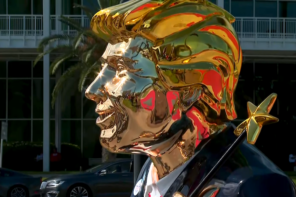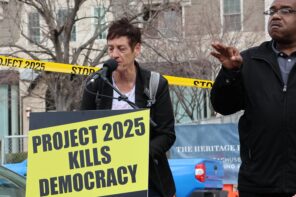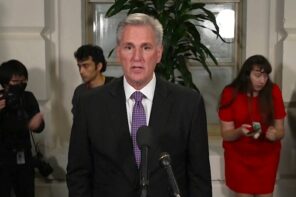With the flames still smoldering after Indiana’s bruising fight over the limits of “religious liberty,” the Catholic bishops are calling for calm, temperate discussion—in the culture war fight they ginned up in the first place.
On NBC’s Meet the Press, New York Cardinal Timothy Dolan discussed the Indiana controversy in what’s become his annual Easter appearance (with MTP apparently under the impression that he speaks for all believers). Dolan, who was president of the U.S. Conference of Catholic Bishops when it began its “religious liberty” drive, professed that the bishops’ organization had nothing to do with creating a fervor around the issue:
I welcome the fact that the question about religious liberty is in the forefront. We need that. We didn’t put it there. We believers didn’t put it there. The Founders of our nation did.
Except it’s pretty clear that who “put it there” was the U.S. bishops. As the New York Times reported, the philosophical roots of the “religious liberty” issue in its current incarnation can be traced back to the 2009 Manhattan Declaration, a manifesto issued by Catholic, Evangelical and Eastern Orthodox religious leaders, including some 50 Catholic bishops, who forswore cooperation with laws sanctioning same-sex marriage or abortion.
It was they who recast “religious liberty” beyond its traditional meaning to include the right of individuals and institutions who disagree with “a right to kill the unborn” and “engage in immoral sexual practices” to “express freely and publicly their deeply held religious convictions” in the public square:
…such persons claiming these “rights” are very often in the vanguard of those who would trample upon the freedom of others to express their religious and moral commitments … We see it in the use of antidiscrimination statutes to force religious institutions, businesses, and service providers of various sorts to comply with activities they judge to be deeply immoral or go out of business.
But, as the Times reported, it was the Catholic bishops who made the manifesto a political reality when they “took the lead” in opposing the contraceptive mandate in the Affordable Care Act, suggesting that it was an “infringement of religious freedom” to require religious institutions or Catholic business owners to cover birth control:
Soon bishops were holding rallies and Masses devoted to religious liberty, urging Catholics to pray and become politically active. A conservative think tank in Washington, the Ethics and Public Policy Center, hired a state policy director … and created a program to work the statehouses and advise elected officials interested in sponsoring religious rights acts…Conservative leaders held conferences, drawing into the coalition Mormon leaders and a small showing of Orthodox Jews, Muslims and Sikhs, along with legal advocacy groups, and conservative organizations like the Family Research Council and the Heritage Foundation.
Much like it created, and even named, the pro-life movement, which was then taken up by a coalition of religious conservatives, the bishops’ conference made the words “religious liberty” flesh by attaching them to the specific issue of the contraceptive mandate, drawing parallels with same-sex marriage, and then rhetorically inciting panic that fundamental religious freedoms were under attack.
In 2011, for instance, Dolan charged that “well-financed, well-oiled” sectors of society were trying to “neuter religion” and push it “back into the sacristy.”
Yet now Dolan fashions himself as the voice of moderation:
Without questioning the rights of the gay community, we also have to make sure the rights of the religious community are protected. I just wish we could do that in a temperate, civil way instead of screaming at each other.
Having successfully thrust the issue into the conservative consciousness—and under the moderating rhetorical influence of Pope Francis—the bishops are now playing the role of consensus builders seeking compromise. They’ve swapped the alarmist rhetoric for the more palatable official church teaching that proclaims the dignity of all people and condemns “unjust discrimination” against homosexuals.
Of course, that’s the rub. To the bishops, allowing people to turn away same-sex individuals or couples for religious reasons is perfectly just discrimination. On Fox News Sunday, Washington Cardinal Donald Wuerl, who’s embroiled in a fight over two local ordinances that would limit discrimination by religiously affiliated organizations, defended the church’s definition of non-discrimination and said it was the Catholic Church being discriminated against:
If we talk about discrimination, we have to talk about discriminating against the Catholic church … I wonder if across the board we aren’t seeing different measuring rods being used … why would it be discrimination for a Catholic university to say we aren’t going to allow a gay rights or an abortion rights group to have their program on our campus and it not be discrimination for that group to insist that the Catholic school change their teaching? If we use the same measure, I think we will find a way to lower the decibel level and recognize the dignity of everyone.
Except no one is suggesting that the church or Catholic schools be forced to change their teaching, only to not deploy it in a way that is discriminatory in public accommodations.
Also calling for a “sensible national conversation” are the same people who lit the “religious liberty” fire in the first place by suggesting that abortionists and sodomites were shredding the First Amendment.
Princeton Professor Robert George, one of the drafters of the Manhattan Declaration, Baltimore Archbishop William Lori (who as head of the bishops’ Ad Hoc Committee on Religious Liberty spearheaded the “Fortnight for Freedom”), Philadelphia Archbishop Charles Chaput (one of the most outspoken church critics of same-sex marriage), and two of their staunchest Evangelical allies, Albert Mohler, Jr., of the Southern Baptist Theological Seminary, and Russell Moore, president of the Ethics and Religious Liberty Commission of the Southern Baptist Convention, released a statement lamenting the “acrimony and lies” surrounding the Indiana debate:
In recent days we have heard claims that a belief central to Judaism, Christianity, and Islam—that we are created male and female, and that marriage unites these two basic expressions of humanity in a unique covenant—amounts to a form of bigotry. Such arguments only increase public confusion on a vitally important issue. When basic moral convictions and historic religious wisdom rooted in experience are deemed “discrimination,” our ability to achieve civic harmony, or even to reason clearly, is impossible.
But it’s religious conservatives who have sown confusion by labeling efforts to prevent the imposition of faith-based beliefs in the public square “discrimination” because they’ve lost the larger debate about the legalization of same-sex marriage. The best way to “lower the decibel level” and have a civil conversation is to not shout “fire” in the first place.




